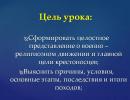A message about the uniqueness and emergence of the Russian language. A Brief History of the Russian Language
reflections.
A little subjective history.
Have you ever wondered about the origin of our Great and Mighty? Where does our language come from? Having attended Dmitry Petrov’s lecture “On the Origin of Languages” in the summer, I never received an answer to the main question, although the lecture was undoubtedly very interesting.
Many adhere to the views of the so-called “Norman theory”, that it is the people-tribe of Rus' that takes its roots from Scandinavia (Varangians). If you look at the map and realize the endless expanses of our homeland, then this theory turns out to be too narrow. I'm sure we have more in Russia than we imagine.
The Scandinavian influence on Rus' was indeed significant, but only in one of its geographical parts. True, it cannot be denied that the first legitimate power was still with the Varangians (Rurik).
My personal subjective opinion: Scandinavian tribes assimilated on the territory of Rus' with the tribes that lived there at that time
Most likely the Rus are not Slavs or Scandinavians, but a peculiar mix. Varangian-Russian ethnic community.
There were many tribes. That is, the tribe “Rus”, and the territory “Rus” was the territory of present-day Ukraine (Kievan Rus), and the Slavs, apparently, lived on Novgorod Land.
In general, the Novgorodians for a long time did not consider themselves Russians at all, the word Rus belongs to their territory. In Novgorod birch bark letters, as well as in chronicles for some time, there are stories that such and such a bishop in such and such a year went to Rus' from Novgorod, that is, went south, to Kiev or Chernigov. - Andrey Zaliznyak (outstanding linguist, academician).
I always had the impression that our country has always been some kind of separate state, in comparison with the Western world, and its economic and political formation began much earlier than Rurik’s coming to reign. But intuitively I feel that real Russia not in Moscow, but much further from it, somewhere there, to Novgorod and beyond. And near Moscow, the influence of Western culture is really strong, which often determines the mentality. We are close. In general, many Russian people living to the north have a harsh mentality. Kind, good, but harsh. Hence all the stereotypes about bears and Siberia and vodka. Not out of nowhere. Cold. And there it is already.
About the language.

The Slavic branches grow from the powerful trunk of the Indo-European family, which covers most languages of Europe and India. The Indian and Iranian groups are represented in the East. In Europe, languages originate from Latin: Italian, Spanish, Portuguese, Romanian. Greece and Greek are represented first by Ancient Greek, and now by Modern Greek. From Germany we received German, Swedish, Norwegian, Danish, Icelandic, and English. Baltika combines the Baltic languages and Slavic.
The Baltic branch includes Latvian, Lithuanian and the now extinct Old Prussian. And the Slavs were divided into 3 groups: South Slavic, West Slavic and East Slavic languages.
- South Slavic - these are Bulgarian, Serbian, Slovenian, Macedonian;
- Western Slavic are Polish, Czech, Slovak, Lusatian.
- And the East Slavic languages (OURS) are Russian (otherwise Great Russian), Ukrainian and Belarusian.
After the divine coming of the brothers Cyril and Methodius, the language in Rus' acquired an alphabet and commonality. After all formerly tribes spoke in their own dialects. Cyril and Methodius came from Byzantium, therefore, they brought us part of the Greek. Did the shades of Greek influence the Russians? Maybe.

Church Slavonic appeared. Language of Worship. The language of the elite. Simple people they didn't speak it.
And Old Russian, which was used as a folk language.
In comparison with Church Slavonic, in contrast to it.
The Russian language was perceived as a simple language, not just neutral, but even a little derogatory. “Russianize” means to descend, to stop looking after oneself. Inadmissible for expressing spiritual content.
Russian language and Sanskrit.

Sanskrit is the ancient literary language of India. It is considered the same language of the elite as Latin, like Church Slavonic, but only in India. Sacred language. A huge number of religious texts and high literature are written on it.
Slavic and Sanskrit have a lot in common. Probably because Sanskrit belongs to the Indo-European family and has a common root. I am sure that the mutual influence of India and Russia did not stop there. Russia is still too big.
A close connection can be seen between words such as “ jnana " and "knowledge", " Vidya " and "knowledge", " dvara " and "door", " mrityu " and "death", " Shveta " and "light", " jiva " and "alive", Isn't it?
A great expert in languages, dialects, professor and linguist Durgo Shastri, came to Moscow half a century ago. He didn't speak Russian. A week later, the professor refuses the translator, saying that he began to understand the Russians because they speak corrupted Sanskrit. There are such cases.
When I was in Moscow, at the hotel they gave me the keys to room 234 and said “dwesti tridtsat chetire”. In bewilderment, I could not understand whether I was standing in front of a nice girl in Moscow or whether I was in Benares or Ujjain in our classical period some 2000 years ago. In Sankrit 234 it will be “dwsshata tridasha chatwari”. Is there a greater similarity possible anywhere? There are hardly two other different languages that have preserved their ancient heritage - such close pronunciation - to this day.
I had the opportunity to visit the village of Kachalovo, about 25 km from Moscow, and was invited to dinner by a Russian peasant family. Elderly woman introduced me to a young couple, saying in Russian: “On my seen i ona moya snokha.”
How I wish that Panini, (the great Indian grammarian who lived about 2600 years ago), could be here with me and hear the language of his time, so wonderfully preserved with all the minutest subtleties! - Durga Prasad Shastri
Of course, the influence on the modern Russian language is simply enormous; a huge number of words have already been borrowed from those countries with which we have been able to communicate closely over all periods of history.
To be honest, the modern Russian language contains traces of influences from almost all four corners of the world.
BORROWING.
Sail from the Greek “Pharus”.
During the expansion of the Goths - König, king - Prince.
Regiment from the German “Volk”.
Kaufenfrom German“ Buy”.
Words of Turkic origin for example words like shoe, boar, cap, brick, product, lumber room, Cossack, cauldron, mound.
Bazaar, Barn, Attic are words of Turkish origin.
Watermelon. In Persian it is “Harbuza”. In Persian it is watermelon, Where har this is a “donkey”, and booza- "cucumber'. Together it turns out to be a “donkey cucumber”, and, by the way, it means not a watermelon, but a melon.
From the Swedes - Herring, herring. By the way, the word “Finns” also came to us from the Swedes. The Finns themselves call themselves “Suomi”.
Words cruiser,skipper, flag- Dutch. There are several dozen such words. Appeared during the reign of Peter the Great.
See how much neighboring languages influence the formation of words. The Russian language has communicated with a huge number of languages, at least two dozen. And if we count isolated cases, then there are a dozen more with long-distance connections.
The Russian language belongs to the group of Slavic languages, part of the Indo-European language family. Is the official language adopted in the territory Russian Federation and the most numerous in terms of geographical distribution and number of speakers in Europe.
Story
Modern lexical and grammatical norms of the Russian language appeared as a result of the long-term interaction of various East Slavic dialects that existed on Great Russian territory and the Church Slavonic language, which arose as a result of the adaptation of the first Christian books.
East Slavic, also known as the Old Russian language, was the basis for the formation of the Russian, Ukrainian and Belarusian languages in the 14th-15th centuries, but the dialectical features that make them so different appeared somewhat earlier.
Dialects
In the 15th century, two main groups of dialects established themselves on the European territory of Russia - the southern and northern dialects, which have a number of distinctive features, for example, akanye is characteristic of the southern dialect, and okanye is characteristic of the northern one. In addition, a number of Central Russian dialects appeared, which were essentially intermediate between the northern and southern ones and partially absorbed their distinctive features.
A bright representative of the Central Russian dialect, Moscow was the basis for the emergence of the literary Russian language, which is currently classical Russian; literature and periodicals are not published in other dialects.
Vocabulary
A large layer in the Russian vocabulary is occupied by words of Greek and Turkic origin. So, for example, diamond, fog and pants came to us from the Turkic language, and crocodile, bench and beets are words Greek origin, also, in our time, it is no secret to anyone that most of the names given at baptism also came to us from Greece, and these names were not only Greek, such as Ekaterina or Fedor, but also of Hebrew origin, such as Ilya or Maria.
In the 16th-17th centuries, the main source of the emergence of new lexical units in the Russian language was Polish, thanks to which such words of Latin, Germanic and Romance origin as algebra, dance and powder and directly Polish words, for example bank and duel, came into our speech.
In Belarus, Russian is the official language along with the Belarusian language. In Kazakhstan, Kyrgyzstan, South Ossetia, Abkhazia and the Transnistrian Moldavian Republic, Russian is recognized as the official language, that is, it has a privileged status despite the presence of the state language.
In the US, in the state of New York, Russian is one of the eight languages in which all official election documents are printed, and in California, you can take the driver's license exam in Russian.
Until 1991, Russian was used for communication in the territory former USSR, essentially being the state language. For this reason, for many residents of the republics that seceded from the USSR, Russian is still their native language.
In the literature there are such names of the Russian language as Russian and Great Russian, but they are used mainly by linguists and in modern colloquial speech are not used.
The alphabet of the Russian language, consisting of thirty-three letters in the form in which we are all accustomed to seeing it, has existed since 1918, and was officially approved only in 1942. Until this time, the alphabet officially had thirty-one letters, because E was equated with E, and Y with I.

From its inception to the present day, the Church Slavonic language has been the language used in Orthodox services. For a long time, it was Church Slavonic that was used as the official written language and predominated in spoken language.
The oldest monument of literary art written in Russian is the Novgorod Codex, its appearance dates back to the beginning of the 11th century. In addition to it, historians mention the Ostromir Gospel, written in Church Slavonic in 1056-1057.
The modern Russian language that we use, also known as the literary language, appeared in the 17th-18th centuries, after which it underwent serious intervention in 1918, with a reform that removed the letters “decimal i”, “fita” and “yat” from the alphabet. , instead of which the letters “i”, “f” and “e” appeared, respectively; in addition, the use of a hard sign at the ends of words was canceled. In prefixes, it has become customary to write the letter “s” before voiceless consonants, and “z” before vowels and voiced consonants. Some other changes were also adopted regarding the use of endings in different case forms and replacing a number of word forms with
more modern. By the way, the official changes did not affect the use of Izhitsa; this letter was rarely used even before the reform, and over time it disappeared from the alphabet.

Differences in dialects have never been an obstacle to people communicating with each other, however, compulsory education, the advent of printing and means mass media and large-scale migration of the population during the USSR, almost completely forced the dialects out of use, as they were replaced by standardized Russian speech. Currently, echoes of the use of dialects can be heard in the speech of representatives of the older generation living mainly in rural areas, but, thanks to the spread of television broadcasting, their speech is also gradually leveling out, acquiring the outlines of a literary language.
Many words in modern Russian came from Church Slavonic. In addition, the vocabulary of the Russian language was significantly influenced by those languages with which it was in contact for a long time. The oldest layer of borrowings has East German roots, as evidenced by words such as camel, church or cross. A few but frequently used words were borrowed from ancient Iranian languages, the so-called Scythian vocabulary, for example, paradise or dog. Some Russian names, such as Olga or Igor, are of Germanic, most often Scandinavian origin.

Since the 18th century, the main stream words are coming to us from Dutch (orange, yacht), German (tie, cement) and French (beach, conductor) languages.
Today the main flow of words comes to us from in English, and some of them began to appear at the beginning of the 19th century. The flow of English borrowings intensified in the first half of the twentieth century and gave the Russian language such words as station, cocktail and container. It is interesting to know that some words twice entered Russian speech from English, displacing each other, an example of such a word is lunch (formerly lunch), in addition, modern English borrowings are gradually replacing earlier borrowings from others in the Russian language, for example English The word “bowling” with its appearance displaced the old German word “skittle alley” from use, and the old French lobster became the modern English lobster.
It is impossible not to note the influence of other languages, although to a much lesser extent than English, on the modern sound of the Russian language. Military terms (hussar, saber) came to us from Hungarian, and musical, financial and culinary terms (opera, balance and pasta) from Italian.
However, despite the abundant influx of borrowed vocabulary, the Russian language developed independently, managing to give the world many of its own words, which became internationalisms. Examples of such words are vodka, pogrom, samovar, dacha, mammoth, satellite, tsar, matryoshka, dacha and steppe.
Teacher's advice:
Learning a foreign language becomes easier when you practice it a little every day. Each language has its own special sound. The more you listen to the language, the easier it becomes. Reading helps strengthen your grammar and your vocabulary, so read every day. It doesn't matter if you listen to the news or music, or read a book, magazine or website, the most important thing is a little bit every day.
Learning a language becomes easier when you practice a little every day. Every language has a different sound and the more you listen the easier it gets. Reading improves your grammar and vocabulary so read a little every day too. It doesn't matter if you listen to the news or music, or read a book, magazine or website, the important thing is to a little every day.
The Russian language is one of the largest languages in the world, the state language of a multinational and, as a consequence, the language of interethnic communication of the peoples of the country. It is the main language of international communication in the countries of the former USSR and the current language of the UN.
The modern Russian language, as we know it now, and as it is studied abroad, has long history origin. Its predecessor was the Old Russian language (from the 7th to the 14th centuries), the language of the Eastern Slavs located on the territory of the Kievan state. Since all Slavic languages had a common ancestor - the Proto-Slavic language, the emerging Old Russian was similar to the languages of the South Slavic and West Slavic peoples, but, from the point of view of phonetics and vocabulary, it had some differences. Next, feudal fragmentation occurred, which led to the formation of a number of dialects. The Mongol-Tatar and Polish-Lithuanian conquests left their mark, causing the collapse (collapse of the Kyiv state) in the 13th-14th centuries. and consequently the collapse of the common Old Russian language. Three independent but closely related East Slavic languages were formed: Russian (Great Russian), Belarusian and Ukrainian.
As for writing, the Slavic states (modern Czech Republic, Slovakia and Hungary, Bulgaria) and later Russia and the development of the church as state institute required special rituals and readings of liturgical books; at first it was carried out in Greek, but then it appeared Old Slavonic language. This language was created by Cyril and Methodius to adapt Greek writings; it was not just made up, it was based on the language of the South Slavic peoples. The Greek scientist Cyril and his brother Methodius used it to adapt Slavic speech to the expressions and ideas that Christian teaching wanted to convey, since, for example, the pagan religion and the Christian religion had different lexical content and the concept of God. This is how the Old Church Slavonic language acquired the name Church Slavonic. Initially it was Glagolitic, but since some sounds were missing for complete adaptation, Cyrillic appeared (a Greek set of letters supplemented in accordance with Glagolitic). The Church Slavonic language was exclusively written.
At this time, spoken Russian was undergoing its own changes; from the 14th to the 17th centuries, dialects continued to develop. Two dialect zones were formed: the Northern Great Russian dialect and the Southern Great Russian dialect with an intermediate Central Great Russian dialect. The leader was the dialect (later it became the basis for the literary language).
In the 17th century, during the reign, many transformative measures were carried out, including language reforms. European education became popular, science and technology developed, and translations of foreign books that were accessible and understandable to the general public were needed. All this required new means of expression, which the Church Slavonic language could not provide. His vocabulary and semantics carried more of a church-religious idea than resembled free “living speech.” What was needed was a literary language accessible to wide circles of society. The Church Slavonic language was relegated to the background in the 18th and early 19th centuries. became a kind of church jargon, intended only for worship. Popularity grew foreign languages, secular society tried to introduce them into their native Russian as much as possible. There was a threat of language clogging and then the need arose to create unified national language norms.
The 20th century brought new, major events in Russia, and with them changes in the Russian language. The economy, culture, and technology continued to develop. It began to be enriched with new words, terminology, stylistic devices, etc. Socialism came to power through the revolution. The level of literacy has increased, the literary language has become the main language of communication of the people. Russian literature gained worldwide fame, and at the same time, interest in studying the language itself increased abroad.
Over the centuries of its existence, the Russian language, like any other living and developing system, has been repeatedly enriched by borrowings from other languages. The earliest borrowings include “Balticisms” - borrowings from the Baltic languages. However, in this case, we are perhaps not talking about borrowings, but about vocabulary preserved from the time when the Slavic-Baltic community existed. “Balticisms” include words such as “ladle”, “tow”, “stack”, “amber”, “village”, etc. During the period of Christianization, “Grecisms” entered our language - “sugar”, “bench”. “lantern”, “notebook”, etc. Through contacts with European peoples, “Latinisms” - “doctor”, “medicine”, “rose” and “Arabisms” - “admiral”, “coffee”, “varnish”, “mattress”, etc. entered the Russian language . Large group words entered our language from the Turkic languages. These are words such as “hearth”, “tent”, “hero”, “cart”, etc. And finally, since the time of Peter I, the Russian language has absorbed words from European languages. Initially, this is a large layer of words from German, English and Dutch related to science, technology, maritime and military affairs: “ammunition”, “globe”, “assembly”, “optics”, “pilot”, “sailor”, “deserter” " Later, French, Italian and Spanish words related to household items and the field of art settled in the Russian language - “stained glass”, “veil”, “couch”, “boudoir”, “ballet”, “actor”, “poster”, “pasta” ", "serenade", etc. And finally, these days we are experiencing a new influx of borrowings, this time mainly from the English language.
Short story Russian language
Russian is one of the most widely spoken languages in the world, fifth in terms of the total number of speakers. Moreover, it is the most widely spoken Slavic language in Europe. According to the classification, it belongs to the East Slavic subgroup of the Indo-European family of languages.
In the prehistoric period, the language of the Slavs was a complex group of dialects of different tribes. At the same time, the Old Russian language was divided into three ethnolinguistic groups: Southern Russian, Northern Russian and Central Russian (Eastern Russian).
The origin of the Old Russian literary language dates back to the 11th century AD, that is, to the period of formation Kievan Rus. Greek culture had a certain influence on the formation of writing. However, the use of the Greek alphabet could not fully convey the features of the Slavic language, so the Byzantine Emperor Michael III ordered the creation of a new alphabet for the Old Church Slavonic language.
This process facilitated the simplified translation of Greek religious texts into Slavic. As a rule, the creation of the Russian literary language is associated with the Christian preachers Cyril and Methodius. The rapid spread of writing and the development of language in Ancient Rus' led to the fact that the Slavic language was on a par with the leading languages of the era.
Language became the main factor in the unification of Slavic peoples from the 9th to the 11th centuries. One of the outstanding literary monuments of that period is “The Tale of Igor’s Campaign” - a work about the campaign of the Russian princes against the Polovtsians. The author of the epic has not been identified.
In the period from the 13th to the 14th centuries, due to feudal fragmentation, the increased influence of the Mongol-Tatar yoke and frequent raids by Polish-Lithuanian troops, changes occurred in the development of the Russian language. Since then, it has been divided into three groups: Great Russian, Ukrainian and Belarusian.
With the formation of Muscovite Rus', some reforms took place in written speech. The sentences became short, with an abundance of everyday vocabulary and folk sayings. A striking example of this language was the work “Domostroy”, published in the middle of the 16th century. Printing played a significant role in the development of the literary language.
In the 17th century, the Polish language became the supplier of scientific, technical, legal and other terms in Europe. Thus, the Russian language was gradually modernized. At the beginning of the 18th century, the alphabet underwent reforms and became closer to the European model. The Russian literary language henceforth existed independently of church ideology.
In the second half of the 18th century, the influence of French, and along with this, the Europeanization of Russian society intensified. Around the same period, M.V. Lomonosov introduced new norms for the literary language, establishing a system of styles and uniting all varieties of the Russian language (orderly, oral speech, regional variations).
Other writers who influenced the development of the Russian language in the 18th - 19th centuries were Fonvizin, Derzhavin, Karamzin, Gogol, Lermontov and, of course, Pushkin. It was A.S. Pushkin who was able to show all the richness and beauty of the Russian language to the fullest, freeing it from stylistic restrictions.
In the 20th century, under the influence of the socio-political life of Russia, the Russian language was enriched with many new words and expressions. In many ways, the development of these lexical forms was facilitated by the media and Internet communications.






